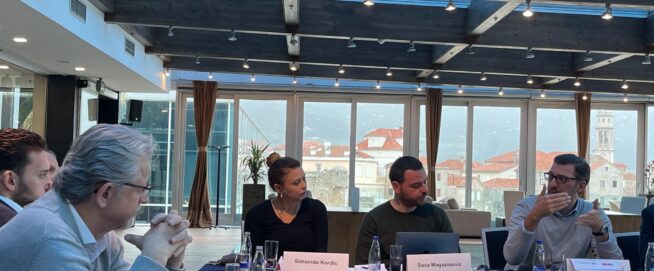
News
 Budva, Montenegro
Budva, Montenegro WHITHER THE BALKANS?

The Western Balkans needs more attention and commitment from the US and the EU who should combine EU’s membership incentives with US’s political influence. The EU and the US could prepare funding packages for investment in infrastructure, but also hold the region’s leaderships accountable for their actions. Geopolitical pragmatism should not be to the detriment of democratization. The EU should not lower the membership bar for reforms. The countries need to reform their judiciary and fight corruption not because these reforms are required for the EU membership but because they are good for the people. “We need leaderships that say we do reform not for the EU membership but for our own prosperity.” The EU should adjust its approach to prevailing circumstances and the region should ‘correct’ its governance approach. Ultimately, change will have to come from the inside, but the EU and the US can help reinforcing it from outside.
After the war in Ukraine, the EU has become more strategic in its decision-making. It lowered the reform bar to give candidate status to Ukraine, Moldova, and likely to Bosnia and Herzegovina. At the same time, unfortunately, the EU has also brought history and identity into the accession process, as reflected in the disputes between North Macedonia and Bulgaria and North Macedonia and Greece. Albania is fast becoming a frontrunner largely because of the judiciary reform through the vetting process. This should be a lesson for other aspirants. Judiciary reform and fight against corruption is what the EU looks for. The region for now remains way too far from membership. The region is not making significant headways while the EU is not holding faithfully its part of the bargain either. The EU is not rushing into another accession largely because of Bulgaria’s and Romania’s inclusion into the union before they were ready. This is why now the EU insists judiciary reform should be done before accession is approved. Poland’s and Hungary’s increasingly illiberal behavior also deters other EU’s more liberal states from bringing into the union more illiberal democracies, such as those in the Western Balkans fearing it could complicate the deepening of the EU.
Bilateral and internal disputes, such as Bosnia and Herzegovina’s ethnic-driven issues and the Kosovo-Serbia political strife, continue to hold the region back. The decade-long ‘EU enlargement fatigue’ should be converted into an active EU foreign policy with an upgraded enlargement strategy. Given the geopolitical situation after the Russian aggression in Ukraine, the Western Balkans is high on US’s and EU’s agendas, but the two actors need stronger and more effective policies. Albania and North Macedonia broke ‘the EU integration status quo’ through opening accession negotiations with the EU and have set a good example the remaining countries should follow.
To discuss the region’s future, the Council for Inclusive Governance (CIG) and the Rockefeller Brothers Fund (RBF) organized a roundtable on November 19, 2022, in Budva, Montenegro, for a number of political party representatives and political observers from the Western Balkan countries to discuss the current state of affairs in the region and how various democracy-related reforms could accelerate the EU integration process. Two former senior US and EU officials also participated in the discussion where they offered an overview of the region from an external viewpoint and how to contribute to establishing a more effective strategy in reviving the Western Balkans’ European integration process. The discussion, held under Chatham House Rules. Gresa Baftiu, CIG’s associate in Kosovo, prepared the report below. This report does not necessarily reflect the views of individual participants, CIG, or RBF, but rather provides an overview of the discussion as a whole.








